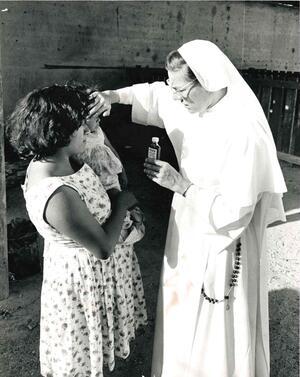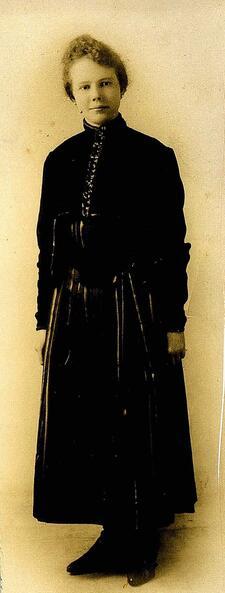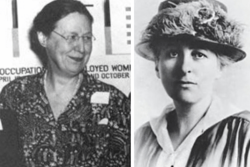The Women Who Organize
Many of us have been shaped by fearless women. I know I have. Two women in particular have had a profound impact on me, causing me to rethink my mission in life. They shared with me their triumphs over adversity and challenged me to act on my passions; they modeled how to put legs on my values. My gratitude compels me to honor their memory by sharing the stories of their courage and compassion: Sister Mary Siena Schmitt, O.P. (Dominican sister) and Mary Goetz, my grandmother.
Sister Mary Siena Schmitt, O.P. was a Dominican Sister (Order of Preachers) who had grown up unaware of the impact of U.S. intervention abroad, and wanted to serve the poor in Guatemala. I met her in 1983, when I was a clueless 25-year-old teaching classes at St. Pius X High School, run by Sr. Sienna’s religious order.
At that point in my life, I believed that U.S. intervention in Central America was in the best interests of Central Americans, as well as Americans. Sister Schmitt set me straight: American tax dollars propped up exploitative, multinational corporations, like the United Fruit Company, and funded death squads. Her stories started a fire in me. She taught me about power and how to build it through organizing Christian-based communities. Through my relationship with her, I learned about the principles of liberation theology, which she had employed with Guatemalan villagers. It nearly cost her her life.
The Guatemalan military threw four of Sister Schmitt’s parishioners out of a plane to their deaths in an attempt to learn where they could find (and kill) her. She escaped their clutches by the skin of her teeth. Through her, I met refugees whose heart-wrenching stories of torture at the hands of the Salvadoran military shook me to my core, and made me question everything I thought I knew. I hadn’t yet connected my passion around justice to my own experience of being victimized years earlier.
My first organizing action, before I knew what an action was, was refusing to take down a poster of Martin Luther King in a Catholic high school classroom where I taught. Three influential parents threatened to fire me if I didn’t take down the poster. When I refused, my principal backed me 100 percent, despite enormous pressure.
This experience, and Sister Schmitt’s persistence, prompted me to attend an organizing boot camp called Neighbor to Neighbor (N2N) in the steamy summer of 1987 in Chicago. We launched a national campaign to stop U.S. aid to the Nicaraguan contras. From Sister Schmitt, I learned these three valuable lessons about organizing:
Lesson #1: Don’t back down from what you know is the right or strategic thing to do, no matter the cost. If Sister Schmitt could be fearless and risk getting murdered for helping Guatemalan villagers, surely I could find the courage to follow my passions for organizing against U.S. intervention and exploring Judaism. I converted to Judaism a few years later.
Lesson #2: Developing a leader requires developing the whole person, not just the part of them that is affected by a particular issue. Sister Schmitt had developed Guatemalan villages so that residents there could discover their own power. Some became insurgents, while others led their communities.
Lesson #3: Don’t just defend the most vulnerable among you: the poor and oppressed, the widow and the orphan. Rather, organize side by side with them, and be clear about why you care. Instead of being their champion, become their partner.
Mary Goetz, my grandmother, was a 4’ foot 10” force of nature. “No” and “can’t be done” weren’t part of her vocabulary. Adversity just made her roll up her sleeves even higher. She gave the Almighty His marching orders every morning, Tevye-style.
Her story inspired my passion for training Rabbis and Cantors to organize. When Mary’s father died, her mother was penniless, with five children to feed. The sheriff threatened to dump Mary and her siblings in an orphanage. But their priest stood up to the sheriff, preventing the family from being torn apart. He provided my great-grandmother with odd jobs at the Church, rent, and groceries. While he certainly saved my family, the service approach fell short. My great-grandmother’s shame about this experience kept them isolated from the rest of their Church because no one ever spoke up about “private” matters.
To help the family make ends meet, Mary and her sister Ann, dropped out of school to work in a factory making rubber soles for tennis shoes. They saved every penny and bought a farm so that they could make a living for the family, which few poor women in the early 1900s could do. Mary refused to accept poverty, and it propelled her to overcome daunting obstacles and defy social norms. From my grandmother, I learned these two lessons about organizing:
Lesson #4: There is no obstacle that can’t be overcome. Mary didn’t allow poverty, the tragedy of her father’s death, or the abusive power of the sheriff, to define or limit her.
Lesson #5: Clergy have power, when they decide to wield it. Mary’s priest used his influence to help save her and her siblings from being torn from their mother’s arms. This shaped my passion to train Rabbis to wield their power for good.
These lessons from Sister Schmitt and Mary Goetz have become part of my DNA, and are embedded in the recesses of my soul. I hope that my daughter will also be shaped by fearless women and that you, reader, will be inspired by these lessons.
A Salvadoran leader once told me that even when our heroes die, they are still present with us and can continue to inspire and agitate us if we say their name and “presente” (present).
Sister Mary Siena Schmitt, presente! And Mary Goetz, presente!







